Kaplan University Studies
- 85 credits of 180 credits completed
"Only
the educated are free" - Epictetus
◄Contents►


Δ
The Degree

Δ
Bachelor of Science in Liberal Studies-emphasis
in Philosophy

The purpose of the Bachelor of Liberal Studies degree is to provide students
with a solid multidisciplinary preparation in the Humanities, Natural
Sciences, Social Sciences and the Arts, subsequently allowing them to pursue
careers in education, business, government, and other such fields. The goal of a
liberal studies major is to train students to communicate effectively, both
orally and in writing, to develop skills in critical thinking and problem
solving, and to imbue critical thinking with ethical thought. Liberal studies
provides students with opportunities for an extensive study of the liberal arts
and sciences and for a broad understanding of various academic fields of
interest.
A student who seeks to be awarded a degree such as B.A. in
Liberal Studies generally undertakes a variety of subjects, including, but not
limited to: literature and language studies, mathematics, visual and performing
arts, physical education, history and social sciences, science, and human
development. According to the American Academy for Liberal Education, core
curriculum can include "interdisciplinary programs in the arts and sciences,
programs of study in the histories and heritages of Western and non-Western
civilizations, global and trans-cultural studies, ethnic and area studies,
musical and theatrical appreciation and performance, and programs in creative
writing."
Δ
Why Philosophy?

Well, I have 5 good reasons: (1) Philosophy is mind-expanding,
you'll learn more on just about everything; (2) Philosophy trains you to be a critical
thinker; (3) You will develop strong writing skills which are valuable in any walk
in life; (4) You will read serious texts and evaluate serious questions that every
great mind should contemplate; (5) And most importantly, philosophy will have a
profound impact on your life and your understanding of the world you live in.
Δ
Why this degree?
You're probably wondering why I wouldn't just choose a computer related degree.
After all, it's what I know and an IT degree would be much easier for me.
Well the answer is simple, I wanted a degree that was 100%, "non-career"
oriented. I
have been studying computer science for the past 24+ years, since 1986. I
have chosen this degree to broaden my horizon, and learn a little bit more about the world I
live in.
Click to see my Program

Δ
President's List

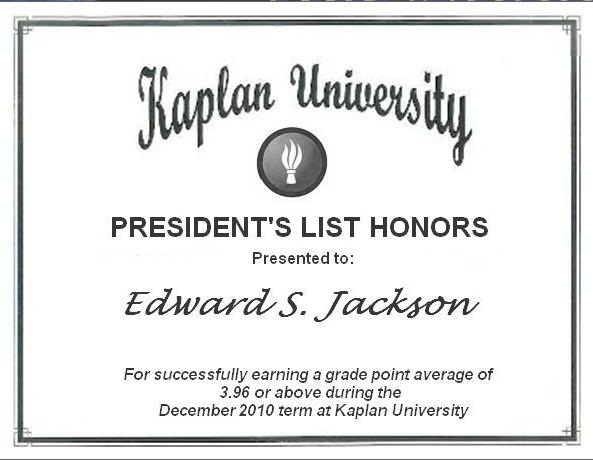 |
4.0 - 03/02/2011
4.0 - 12/08/2010
|

Δ
Papers I Have Written


New: Kaplan University Papers
(click paper to see content)
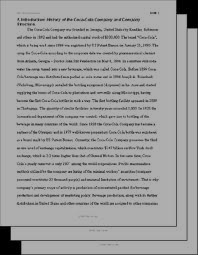
doc pdf |

doc pdf |

doc pdf |

doc pdf |

doc pdf |

doc pdf |

doc pdf |

doc pdf |

doc pdf |
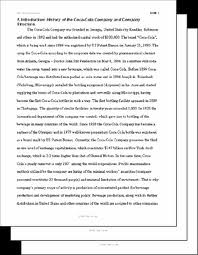
doc
pdf |

doc
pdf |
Old: Chipola College Papers
- to be added
(click paper to see content)
  









Δ
College Library

Δ
Philosophy


doc pdf |

doc pdf |

doc pdf |

doc pdf |

doc pdf |

doc pdf |

doc pdf |

doc pdf |


Δ
3rd Term May 18th, 2011

Δ
HU345 Critical Thnking

(5 Credits)

Professor
Ronald Davenport
Course Description
This course helps students apply tools of informal logic and critical
thinking to practical situations they encounter in everyday life. Students will
learn how to use methods of critical thinking to evaluate arguments, claims, and
strategies for constructing sound arguments. They will also learn how to
identify and respond to faulty or manipulative reasoning in their own thinking
and arguments and in the thinking and arguments of others. In addition, students
will assess the reasoning found in mass media (such as websites, advertisements,
and newspapers). Finally, students will apply the concepts they study to
real-world issues of personal and professional significance.
Target Audience
All
Recommended Background
None.
Prerequisites
English 1102.
Chapters
xxxx
Δ
Discussions
-
(click on unit to see content)
Unit01 Unit02
Unit03
Unit04
Unit05
Unit06
Unit07
Unit08
Unit09
Unit10
Δ
Assignments
-
(click on unit to see content)
Unit01 Unit02
Unit03
Unit04
Unit05
Unit06
Unit07
Unit08
Unit09
Unit10

Δ
2nd Term March 2nd, 2011

Δ
HU245-04: Ethics

(5 Credits)
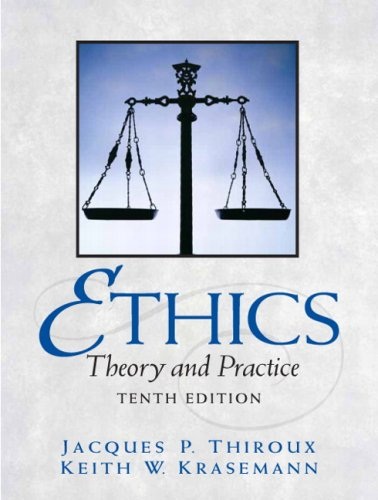
Professor
Jerett Vincent
Course Description
In this course, students develop sound ethical reasoning and judgment through
the study of practical applications of ethical theories. Topics studied include
ethics as it relates to business, health care, society, and the environment.
Emphasis is on practical applications of ethical principles and analytical
methods.
Target Audience
All
Recommended Background
None.
Prerequisites
English 1102.
Chapters
Chapter 1. The
Nature of Morality, 1
Chapter 2. Consequentialist (Teleological) Theories of
Morality, 34
Chapter 3. Nonconsequentialist (Deontological) Theories of
Morality, 53
Chapter 4. Virtue Ethics, 70
Chapter 5. Absolutism Versus
Relativism, 88
Chapter 6. Freedom Versus Determinism, 103
Chapter 7.
Reward and Punishment, 120
Chapter 8. Setting Up a Moral System: Basic
Assumptions and Basic Principles, 156
Chapter 9. The Taking of Human Life,
181
Chapter 10. Allowing Someone to Die, Mercy Death, and Mercy Killing, 207
Chapter 11. Abortion, 253
Chapter 12. Lying, Cheating, Breaking Promises,
and Stealing, 275
Chapter 13. Morality, Marriage, and Human Sexuality, 304
Chapter 14. Bioethics Ethical Issues in Medicine, 332
Chapter 15.
Business and Media Ethics, 361
Chapter 16. Environmental Ethics, 394
Δ
Discussions
-
(click on unit to see content)
Unit01
Unit02
Unit03
Unit04
Unit05
Unit06
Unit07
Unit08
Unit09
Unit10
Δ
Assignments
-
(click on unit to see content)
Unit01
Unit02
Unit03
Unit04
Unit05
Unit06
Unit07
Unit08
Unit09
Unit10

Δ
1st Term December 8th, 2010

Δ
CS123: College Success Strategy for Prof. and Liberal
Studies Prof.

(5 Credits)

Professor
Abigail Nhwako
Course Description
Designed to facilitate personal and professional success, this course introduces
students to the purposes and processes of university education. An emphasis is
placed on study, communication and thinking skills that support academic
achievement. Students also examine the relationship between learning and
motivation.
Target Audience
All
Recommended Background
None.
Prerequisites
None.
Δ
Discussions
-
(click on unit to see content)
Unit01
Unit02
Unit03
Unit04
Unit05
Unit06
Unit07
Unit08
Unit09
Unit10
Δ
Assignments
-
(click on unit to see content)
Unit01
Unit02
Unit03
Unit04
Unit05
Unit06
Unit07
Unit08
Unit09
Unit10

Δ
SC115: Principles of Nutrition

(5 Credits)

Professor
Stacie Kisver
see
ratings
Course Description
This is an introductory level course in which students investigate the
fundamental concepts of nutrition: food sources; nutrient function; digestion;
absorption; and metabolism. Special attention is given to learning to apply
nutritional principles to food choices in a way that encourages a health
lifestyle. Students will learn how nutritional needs change from infancy through
adulthood, including pregnancy and the senior stages of life.This is an introductory level course in which students investigate the
fundamental concepts of nutrition: food sources; nutrient function; digestion;
absorption; and metabolism. Special attention is given to learning to apply
nutritional principles to food choices in a way that encourages a health
lifestyle. Students will learn how nutritional needs change from infancy through
adulthood, including pregnancy and the senior stages of life.
Target Audience
Any
Recommended Background
None.
Prerequisites
None.
Course Objective
By the end of this course, you should be able to:
Describe the role of
nutrition in a healthy lifestyle and disease prevention.
Explain how
nutrients are processed and used in the human body.
Apply nutritional
principles to food choices.
Evaluate nutritional needs at various stages of
the life cycle.
Chapters
1. The Role of Nutrition in Our Health
2. Designing a Healthful
Diet
3. The Human Body: Are We Really What We Eat?
4. Carbohydrates:
Plant-Derived Energy Nutrients In Depth: Alcohol
5. Fat: An Essential
Energy-Supplying Nutrient
6. Proteins: Crucial Components of All Body
Tissues In Depth: Vitamins and Minerals: Micronutrients with Macro Powers
7.
Nutrients Involved in Fluid and Electrolyte Balance
8. Nutrients Involved in
Antioxidant Function In Depth: Phytochemicals and Functional Foods
9.
Nutrients Involved in Bone Health
10. Nutrients Involved in Energy
Metabolism and Blood Health
11. Achieving and Maintaining a Healthful Body
Weight
12. Nutrition and Physical Activity: Keys to Good Health
13.
Disordered Eating
14. Food Safety: Impact on Consumers
15. Nutrition
Through the Lifecycle: Pregnancy and the First Year of Life
16. Nutrition
Through the Lifecycle: Childhood to Late Adulthood In Depth: Global Nutrition
Δ
Discussions
-
(click on unit to see content)
Unit01
Unit02
Unit03
Unit04
Unit05
Unit06
Unit07
Unit08
Unit09
Unit10
Δ
Assignments
-
(click on unit to see content)
Unit01
Unit02
Unit03
Unit04
Unit05
Unit06
Unit07
Unit08
Unit09
Unit10

Δ
Extracurricular Work

These are academic studies that I have participated in outside of my normal
college curriculum; these studies are like audited courses.
Index

Philosophy: PHIL 176
Listening to Music: MUSI 112
Modern Poetry: ENGL 310
Intro to Ancient Greek History: CLCV 205
Fundamentals of Physics: PHYS 200 |
Roman Architecture: HSAR 252
Intro to Theory of Literature: ENGL 300
Dante in
Translation: ITAL 310
|

Δ
PHIL 176: Death
 (0 Credits) (0 Credits)

Professor
Shelly Kagan, Clark Professor of Philosophy, Yale University
see ratings
Course Description
There is one thing I can be sure of: I am going to die. But what am I to
make of that fact? This course will examine a number of issues that arise once
we begin to reflect on our mortality. The possibility that death may not
actually be the end is considered. Are we, in some sense, immortal? Would
immortality be desirable? Also, a clearer notion of what it is to die is
examined. What does it mean to say that a person has died? What kind of fact is
that? And, finally, different attitudes to death are evaluated. Is death an
evil? How? Why? Is suicide morally permissible? Is it rational? How should the
knowledge that I am going to die
affect the way I live my life?
Syllabus
http://oyc.yale.edu/philosophy/death/content/syllabus
Class Sessions
1. Course introduction
2. The nature of persons: dualism vs. physicalism
3. Arguments for the existence of the soul, Part I
4. Introduction to Plato's Phaedo; Arguments for the existence of the soul, Part
II
5. Arguments for the existence of the soul, Part III: Free will and near-death
experiences
6. Arguments for the existence of the soul, Part IV; Plato, Part I
7. Plato, Part II: Arguments for the immortality of the soul
8. Plato, Part III: Arguments for the immortality of the soul (cont.)
9. Plato, Part IV: Arguments for the immortality of the soul (cont.)
10. Personal identity, Part I: Identity across space and time and the soul
theory
11. Personal identity, Part II: The body theory and the personality theory
12. Personal identity, Part III: Objections to the personality theory
13. Personal identity, Part IV; What matters?
14. What matters (cont.); The nature of death, Part I
15. The nature of death (cont.); Believing you will die
16. Dying alone; The badness of death, Part I
17. The badness of death, Part II: The deprivation account
18. The badness of death, Part III; Immortality, Part I
19. Immortality, Part II; The value of life, Part I
20. The value of life, Part II; Other bad aspects of death, Part I
21. Other bad aspects of death, Part II
22. Fear of death
23. How to live given the certainty of death
24. Suicide, Part I: The rationality of suicide
25. Suicide, Part II: Deciding under uncertainty
26. Suicide, Part III: The morality of suicide and course conclusion

Δ
MUSI 112: Listening to Music

(0 Credits)
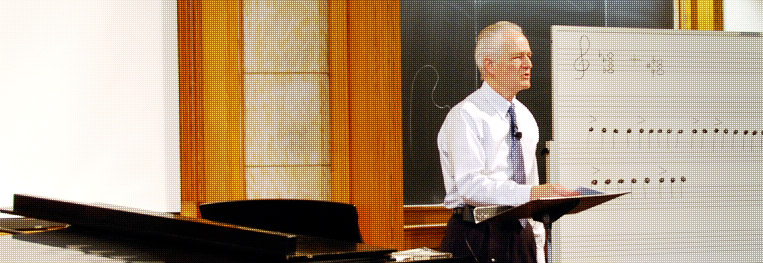
Professor
Craig Wright, Yale University
Course Description
This course fosters the development of aural skills that lead to an
understanding of Western music. The musical novice is introduced to the ways in
which music is put together and is taught how to listen to a wide variety of
musical styles, from Bach and Mozart, to Gregorian chant, to the blues.
SyllabusSyllabus
http://oyc.yale.edu/music/listening-to-music/content/syllabus
Class Sessions
1. Introduction
2. Introduction to Instruments and Musical Genres
3. Rhythm: Fundamentals
4. Rhythm: Jazz, Pop and Classical
5. Melody: Notes, Scales, Nuts and Bolts
6. Melody: Mozart and Wagner
7. Harmony: Chords and How to Build Them
8. Bass Patterns: Blues and Rock
9. Sonata-Allegro Form: Mozart and Beethoven
10. Sonata-Allegro and Theme and Variations
11. Form: Rondo, Sonata-Allegro and Theme and Variations (cont.)
12. Guest Conductor: Saybrook Youth Orchestra
13. Fugue: Bach, Bizet and Bernstein
14. Ostinato Form in the Music of Purcell, Pachelbel, Elton John and Vitamin C
15. Benedictine Chant and Music in the Sistine Chapel
16. Baroque Music: The Vocal Music of Johann Sebastian Bach
17. Mozart and His Operas
18. Piano Music of Mozart and Beethoven
19. Romantic Opera: Verdi's La Traviata, Bocelli, Pavarotti and Domingo
20. The Colossal Symphony: Beethoven, Berlioz, Mahler and Shostakovich
21. Musical Impressionism and Exoticism: Debussy, Ravel and Monet
22. Modernism and Mahler
23. Review of Musical Style

Δ
ENGL 310: Modern Poetry

(0 Credits)
to be started after MUSI 112
ENGL 310
link

Δ
CLCV 205: Introduction to Ancient
Greek History
 (0 Credits) (0 Credits)
to be started after ENGL 310
CLCV 205
link

Δ
PHYS 200: Fundamentals of Physics
 (0 Credits) (0 Credits)
to be started after CLCV 205
PHYS 200
link

HSAR 252 - Roman
Architecture, Spring 2009
ENGL
300 - Introduction to Theory of Literature, Spring 2009
ITAL 310 - Dante in Translation, Fall 2008

Δ
Other Classes Taken

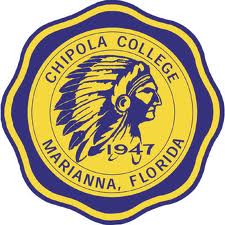
Δ
Credited Classes
PS124 5 Introduction to Psychology
ENC1101 English
MAC1102
College Algebra
ENC1102 Literature
CLP2100 Abnormal Psychology
DEP2102
Child Psychology
AMH2101 AM Hist to 1865
SYG1410 Marriage/Family
Relations
PEL1111 Bowling
PEL1112 Bowling
MVK1111 Piano
MVK1211
Piano
SPN1120 Spanish I
BSC1010L General Biology - Lab
CGS1560 DOS
CGS1561 DOS
Δ
Non-Transferable Classes
CIS1000 Intro to Computer Science
CS C++
CS Fortran
CS PASCAL
MAC Trigonometry
CS dBASE
CS Lotus 1,2,3
CS Visual Basic 2.0
SPN1121
Spanish II

Δ
Kaplan Reviews

click to
download other Kaplan
Reviews
Materials:
*
* * *
*
Institution:
* * * * *
Value:
* * * * *
Teachers:
* * * * *
Support:
* * * * *
Technology:
* * * * *
My Review:
I chose Kaplan for a few reasons, number one it's free through a program called
Gift of Knowledge, and because of the convenience of the online structure; it meshes
well with my career (I work 40 to 50 hours a week).
Overall, the experience is good. It is comparable to any school that I have
been to, and better in some ways. I like
the fact that there are no athletic teams to compete with the quality of
education. The classes are small so you
get to connect with the professor and students.
And most importantly, Iím being taught by a professor, not a teacherís
assistant which is common practice amongst Universities.
For my particular degree, I am able to distill the education I am looking
for. My situation is a little unique in
that I am not at Kaplan for career reasons, but for personal knowledge.

Δ
My Program

click to download
my
Program

Δ
My College Journal

click to download
my
journal

|
|
About
I'm a Computer
Systems Engineer
Living and loving life
........................................
Author
...
|













